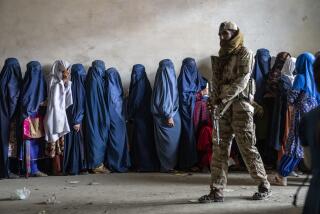Nairobi Women’s Conference Agenda
- Share via
UNITED NATIONS — Governments of the world must adjust to the “new reality” by providing day care for children and getting men to share the housework if women are to contribute to economic growth, the leader of the forthcoming Nairobi Women’s Conference said this week.
Leticia Shahani, secretary-general of the 1985 world conference that will review the United Nations’ Decade for Women ending this year, spoke to reporters after a preparatory group had completed its work. A U.S. delegation headed by Maureen Reagan, daughter of the President, joined more than 100 other national delegations in drafting a program that Shahani said will assess the past decade and make recommendations for the future.
“Consciousness certainly has been raised,” she said. “Women are living longer now than when the decade began, they are a third of the world’s labor force--aside from the ‘invisible’ economy (the unpaid labor that women perform in the home, on farms and in family enterprises)--and the rate of female illiteracy is less.”
Despite these gains, she said, women still suffer in most of the world from the “stereotype image” of wife and mother.
“We have to have planners, politicians and statisticians sensitized to women’s contribution to the Gross National Product,” she said. “We should have a new breed of statistician, trained to measure women’s contributions.”
While women today are told that they can do anything--can become generals or astronauts--the Filipina diplomat warned that governments will have to provide an infrastructure if women are to be full participants in national life.
“This means day-care centers run by competent people, not illiterate women,” she said. “And men will have to share in domestic work.”
Shahani said the usual political conflicts have entered into the preparatory work, so that about a third of the program is still tentative. The disputes involve such subjects as the Arab-sponsored issue of the suffering of Palestinian women in Israeli-occupied territory. It’s an important question, she acknowledged, but she said she hopes “some formula” can be found to deal with the problem so that it won’t take too much time from general issues for women at the Nairobi meeting in July, where as many as 4,000 delegates are expected.
At least one delegation, that of Canada, will be headed by a male cabinet minister. Shahani said that doesn’t worry her: “Women need allies,” the 56-year-old widow said with a smile. “And their best allies are men.”
More to Read
Sign up for Essential California
The most important California stories and recommendations in your inbox every morning.
You may occasionally receive promotional content from the Los Angeles Times.








